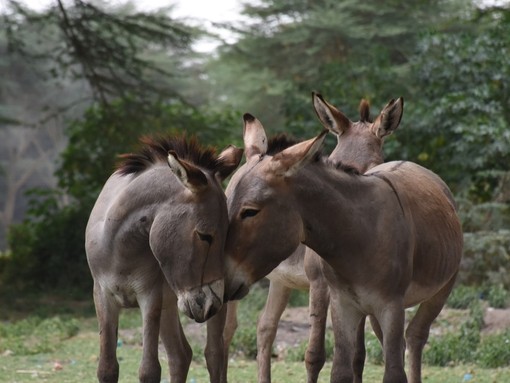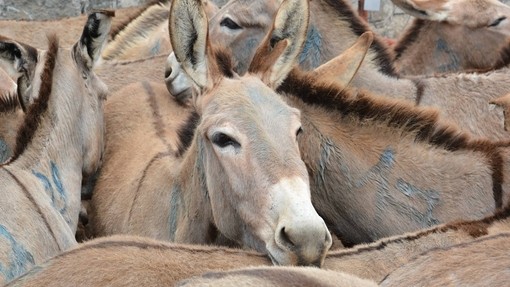
Disrupting the donkey skin trade
We first heard reports of donkeys ‘disappearing’ from villages in Africa and a booming trade in their skins in 2016.
We have since been campaigning to stop the suffering and the slaughter. We are fully committed to bringing the donkey skin trade to a permanent end.
Our time looking into and campaigning against the donkey skin trade has highlighted just how complex and organised the trade is. The trade operates in a fast-moving way, and the landscape is ever-changing.
To counter the intricate and reactive nature of the donkey skin trade, we campaign against it on multiple fronts.
Our plan to Stop the Slaughter and end the use of donkey skins in ejiao is the most significant donkey protection project we have ever undertaken.
To achieve this, we take a three-fold approach:
- Expose the crisis: People care about donkeys and it’s important this isn’t a hidden crisis. But most people still have not heard of the donkey skin trade and its many devastating impacts. We cannot Stop the Slaughter on our own. But together, our voices and efforts will be amplified to give donkeys a future.
- Stop the slaughter of donkeys: We lead on and support a range of tactics to disrupt the sourcing, slaughter and sale of donkeys and their skins in the countries where they live and work.
- End the donkey skin trade: We are working to eliminate the demand for donkeys and their skins. We have demonstrated to the ejiao industry that there are humane, sustainable and safe alternatives to donkey skin through processes of cellular agriculture.
Stopping the slaughter of donkeys
We engage in many activities to help Stop the Slaughter. To disrupt the donkey skin trade at the point of supply, we:
Build alliances and engage in advocacy
We forge influential, supportive connections and encouraging governments, regional bodies, law and policymakers to take a stand against the skin trade.
Conduct investigations and research
We are building robust evidence to support our case to Stop the Slaughter.
Our work in this area includes testing donkey skins and ejiao samples for contagious diseases and toxins, evidencing lawbreaking at slaughterhouses and proving links between the donkey skin trade and organised crime.
Share intelligence
We multiply our efforts through collaboration. We share crucial evidence that can help Stop the Slaughter with other charities, NGOs and organisations interested in protecting equines from harm, conservation and law enforcement.
Take legal action
We initiate legal proceedings to help close illegal slaughterhouses and keep them shut.
Support community initiatives & campaigns
We support projects and campaigns within communities to protect donkeys from harm.
Conduct industry targeted campaigns
Certain industries are (potentially unwittingly) complicit in the illicit donkey skin trade. Our activity includes highlighting to shipping and freight, eCommerce and social media companies that criminal traders are using their services to trade donkey skins alongside other illegal products. We are calling on them to implement measures to stop this.
We need your help to stop the slaughter
Working with others
Working with others to challenge the donkey skin trade crisis
Collaboration is at the heart of our global efforts to Stop the Slaughter.
The Donkey Sanctuary, SPANA, Brooke and World Horse Welfare are part of a unique and important collaboration known as the International Coalition for Working Equids (ICWE), formed five years ago to protect donkeys across the world.
We are united in bringing the cruelty and suffering of the donkey skin trade to an end, alongside other local animal welfare organisations.
Conservation NGOs and international enforcement agencies
The donkey skin trade and illegal wildlife trafficking are closely linked, and the same criminals are involved. Donkey skins and other illegal items can be shipped and sold together, so we are growing our connections to the wildlife conservation community and collaborating with them to help solve mutual issues, identify traders and help bring them to justice.
Governments and regional bodies
The legal status of the donkey skin trade across the world is complex and ambiguous. Where slaughter and export bans are in place, they can be challenged and overturned. Where the donkey skin trade is illegal, enforcement bodies often make minimal effort to address this.
Regional and country lawmakers have the power to make the skin trade illegal and enforce laws, so they are essential stakeholders in the campaign to Stop the Slaughter.
We seek lasting, secure and enforceable trade bans wherever possible.
Find out more
Millions of donkeys are slaughtered for their skins every year. Learn about the causes, impacts and the campaign to Stop the Slaughter here.
Learn about the multiple and catastrophic repercussions the skin trade has on donkeys and the communities that depend on them.

Learn about the traditional Chinese medicine that is driving the demand for donkey skins, and the possible alternatives for a humane future.

Learn about cellular agriculture, a way of sustainably and humanely creating donkey collagen without the need for live animals.

Find out about the criminal elements currently using the donkey skin trade as a smokescreen for other illicit activities.

Find our reports on the donkey skin trade. We regularly publish reports based on our findings from investigative work.

